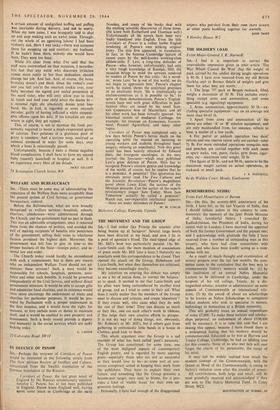IN DEFENCE OF PSNOW
Sla,—Perhaps the reviewer of Corridors of Power Would be interested in the following article from The New African Review of Intellect and Culture, retranslated from the Swahili translation of the German translation of the Russian: Corridors of Power, the last great novel of England by the Russian revolutionary scientist- novelist C. Psnow, has at last been published in England. Psnow knew England well, having spent some years in Cambridge in the early • Nineties, and many of his books .deal with the exciting scientific discoveries of those times. (He knew both Rutherford and Thomson well.) Unfortunately all his novels have been very badly translated into English. Even the title Corridors of Power is a rather feeble English rendering of Psnow's own striking original irony. The title first appeared, in translation, in fact, in the famous Cambridge lecture of recent years by the well-known working-class athlete-critic F. Levi, a long-time defender of Psnow—who, however, unfortunately, had only a very rough knowledge of Russian. Still, the occasion brings to mind the services rendered to readers of Psnow by this critic. 'As a novel- ist,' wrote Levi, 'he is out of this world; we do not begin to appreciate him.' Psnow's chapter work, he stated, shows the analytical precision of an electronic brain. 'He is intellectually as unclass-conscious as it is possible to be.' In spite of these demonstrations, Psnow's 'English' novels have met with great difficulties in pub- lication (they are issued by the small Scot- tish Communist firm of Macmillan); and all his other work has been virtually ignored: his historical novels of mediwval Carthage, for example; his treatises on Economics, Govern- ment, Peasant Agriculture, and many other
• topics.
Corridors of Power was completed only a few days before Psnow's heroic death on the operating table (he insisted on lecturing to young workers and students throughout heart surgery, refusing an aniesthetic). Now this great novel has been heavily attacked by Edward Shils, the bourgeois sociologist, in the very journal—the Spectator—which once published Levi's great defence of Psnow. Shils has to recognise Psnow's creative genius and knowledge of the world, of course, but he implies that he is a pessimist. A pessimist! This ignoramus has obviously never read The Two Cultures and the Scientific Revolution—Psnow's magnificent novel about Lewis Eliot, the saviour of the Mexican peasants. Can the author of the superb revolutionary slogan 'Jam Today. More Jam Tomorrow' actually be called a pessimist? Watch out, neo-imperialist intellectual caperers —there are many defenders of Psnow! •
Makerere College, Kampala, Uganda M. M. CARLIN


































 Previous page
Previous page